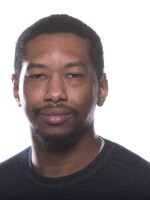The pandemic has brought long-standing racial healthcare inequities into stark relief. And according to a federal report from April 2020, the virus has left communities of color even more vulnerable to behavioral health issues.
These disparities are keenly felt by Black men, who were already underserved and underrepresented in the behavior health field. Clinicians like James Harris, a licensed social worker in Richmond, were trying to serve that need before the pandemic began, and they’ve continued during the new health crisis.
Harris had his own experiences with behavioral healthcare growing up. After losing his father at age five and his mother at age eight, he entered state-mandated counseling with his siblings. Harris says they could have been more effective.
“For me, I didn't obtain as much as I could obtain from it for a couple of different reasons,” he says. “Probably the overall reason was culture. I mean, I could have been a stubborn kid too but to be honest, most of it was, you know, culture related.”
Harris experienced the same cultural disconnect after trying counseling once more following his deployment to Iraq and Afghanistan. He says a lack of male therapists can make it harder for men to pursue help, and he thought he could fill a need in the profession.
“At that point, I was just like man, this seemed like something I got to do myself to ensure that not only that young Black kid from the projects can get a pleasant experience, but of course my veterans,” he said.
After experiencing the inequities within the behavioral health community firsthand, Harris pursued his masters in clinical psychology. He went on to write a book, “Men to Heal,” and founded a private practice with the same name, which also serves as an advocacy organization for men’s mental health.
During his studies, Harris said he learned more about systemic inequality in the mental health field. Some of those inequalities may stem from a lack of representation. According to data from the American Psychiatric Association, only 3% of active psychologists were Black in 2019. Most psychologists, nearly 90%, are white.
Fewer than one-third of Black psychologists are men. Women make up a majority of psychologists across all racial groups, with white women comprising nearly 70% of the total field.
APA statistics also show that only one-in-three Black Americans who need mental healthcare are likely to receive it and Black Americans are less likely to be offered medication, therapy or psychotherapy.
“From a systemic standpoint, just availability, access is limited within [the] demographic, not just for mental health, but of course, access for a lot of different resources,” Harris said.
“Some argue that it’s on purpose, and some argue that it’s just how the cookie crumbles sometimes,” but the disparities are clear regardless of the cause, he said.
After the police killings of George Floyd and Breonna Taylor, psychiatrists sought to address that trauma and structural racism in their field. The APA convened the Presidential Task Force to Address Structural Racism Throughout Psychiatry in June 2020, as Black Lives Matter protests surged across the nation.
Throughout the pandemic, Harris has been able to offer counseling and other services at the Healing Hub on Arthur Ashe Boulevard. Harris offers lessons on stress management, breathing techniques, even yoga classes and meditation.
Harris says his case load hasn’t changed - he’s as busy as before - but that colleagues are seeing a real uptick in clients.
Mickeal Pugh Jr., a doctoral candidate in the psychology department at Virginia Commonwealth University, says he sees the same representation problems Harris does. He aims to address racial discrimination through his work.
“Individuals who experience discrimination in the community will bring those experiences into the healthcare setting,” Pugh said. “And I think it's important for healthcare providers to understand that.”
Pugh says healthcare providers should provide validating experiences in the way they communicate and recommend treatment. As a clinician, Pugh says he hopes to integrate the cultural patterns specific to the Black community and provide a space where their experiences are validated.
“During the pandemic, we have seen time and time again that the spaces that many of us were occupying in were not well equipped to give us what we needed,” Pugh said.
Having therapists and healthcare providers who look like him is an important part in making counseling available and counteracting systemic racism, he says.
“We need spaces for our community,” Pugh said. “We need spaces that validate where we come from, spaces that uphold where we come from, and spaces that provide us resources to thrive.”



